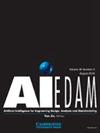在概念设计阶段为用户体验驱动的产品改进提供知识支持的方法
IF 2.3
3区 工程技术
Q3 COMPUTER SCIENCE, ARTIFICIAL INTELLIGENCE
Ai Edam-Artificial Intelligence for Engineering Design Analysis and Manufacturing
Pub Date : 2023-08-17
DOI:10.1017/S0890060423000161
引用次数: 0
摘要
摘要改进现有产品在提高客户满意度和应对市场变化方面发挥着至关重要的作用。分析用户体验以发现现有产品的不足,并制定改进方案,是用户体验驱动产品改进的关键,尤其是在概念设计阶段。尽管概念设计中使用的一些工具,如需求分析和知识推理,最近有所进步,但它们在识别不足的产品属性和改进现有功能和结构方面缺乏有针对性的目标和足够的效率。挑战在于考虑原始产品特征(包括属性、功能和结构)对设计活动的影响。在这项研究中,提出了一种知识驱动的方法和框架,该方法和框架集成了概念设计过程、用户体验在线评论和知识,以支持产品改进。具体地,提出了一种基于用户体验分析的决策算法来识别待改进的产品属性。然后,通过从知识需求转换、知识建模和知识推理等方面对先前的知识应用模型进行优化,建立了智能知识推理模型,将知识推送给待改进属性的函数求解。使用知识配置方法来修改产品特征以生成改进的方案。为了证明所提出的方法的可行性,进行了一个改进农业喷雾器的案例研究。通过讨论,本研究有助于规范产品改进的设计活动,增强数据和知识的应用,促进方案修改过程中的发散思维。本文章由计算机程序翻译,如有差异,请以英文原文为准。
A knowledge-enabled approach for user experience-driven product improvement at the conceptual design stage
Abstract Improving existing products plays a vital role in enhancing customer satisfaction and coping with changes in the market. Analyzing user experience (UX) to find the deficiencies of existing products and establishing improved schemes is the key to UX-driven product improvement, especially at the conceptual design stage. Although some tools used in conceptual design, such as requirements analysis and knowledge reasoning, have advanced recently, they lack targeted goals and sufficient efficiency in identifying insufficient product attributes and improving existing functions and structures. The challenge lies in considering the influence imposed on design activities by the original product features (including attributes, functions, and structure). In this study, a knowledge-enabled approach and framework that integrates the conceptual design process, online reviews for UX, and knowledge is proposed to support product improvement. Specifically, a decision-making algorithm based on UX analysis is proposed to identify to-be-improved product attributes. Then, through optimizing the previous knowledge application model from knowledge requirement transformation, knowledge modeling, and knowledge reasoning, a smart knowledge reasoning model is established to push knowledge for functional solving of the to-be-improved attributes. A knowledge configuration method is used to modify product features to generate an improved scheme. To demonstrate the feasibility of the proposed approach, a case study of improving an agricultural sprayer is conducted. Through discussion, this study can help to regulate design activities for product improvement, enhance data and knowledge application, and promote divergent thinking during scheme modification.
求助全文
通过发布文献求助,成功后即可免费获取论文全文。
去求助
来源期刊
CiteScore
4.40
自引率
14.30%
发文量
27
审稿时长
>12 weeks
期刊介绍:
The journal publishes original articles about significant AI theory and applications based on the most up-to-date research in all branches and phases of engineering. Suitable topics include: analysis and evaluation; selection; configuration and design; manufacturing and assembly; and concurrent engineering. Specifically, the journal is interested in the use of AI in planning, design, analysis, simulation, qualitative reasoning, spatial reasoning and graphics, manufacturing, assembly, process planning, scheduling, numerical analysis, optimization, distributed systems, multi-agent applications, cooperation, cognitive modeling, learning and creativity. AI EDAM is also interested in original, major applications of state-of-the-art knowledge-based techniques to important engineering problems.

 求助内容:
求助内容: 应助结果提醒方式:
应助结果提醒方式:


